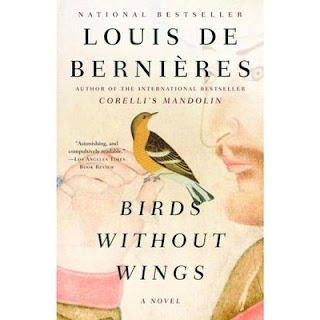Remember Corelli's Mandolin? I did, because I loved it. A compelling, romantic story. That's why I was interested in Birds Without Wings, the novel Louis de Bernieres wrote after Corelli. I was also interested because I visited Turkey in October, and at least three or four people I met along the way said, "You have to read Birds Without Wings," or something to that effect. Because it's set in Turkey. And because it chronicles the rise of Kemal Ataturk, who established the modern nation of Turkey (and whose kinda' scary visage stares out at you from statues and posters everywhere you go in the nation he founded).
Reading a book set in a country you've recently visited sounds like such a good idea. Too bad this isn't the book. This one, set in a small village in Turkey during the waning days of the Ottoman empire, is repetitive, overly cute, and annoyingly showoffy. An "exiguous military moustache"? A "sedulous cultivation of the art of offending military superiors"? An "ebullition of fanaticism"? That wouldn't be so irritating if it didn't feel like he was writing the book with an open thesaurus at his elbow.
(In case you were wondering (as I was), exiguous means small, sedulous means dedicated, and ebullition means bubbling. I read the book with a dictionary at my elbow.)
There are way too many characters, which results in a mile-wide sprawl of a story in which the characters are an inch deep. Far too many feel like a single-tic characterization: one is mad, one blasphemes, one is beautiful, one is ugly. They are not the sum of their parts, they are one part each.
He clearly did an enormous amount of research, and it shows, because it's all there. He scatters foreign words throughout, without defining them, or even providing enough context so the reader can intuit the meaning. Like a good student, he crams it all in (along with those SAT vocab words). But because no one feels real, the enormous tragedies the book encompasses, like the Armenian genocide and the population exchanges, which destroyed lives and killed millions, arouse no emotion, no sense of loss.
The general point of the book seems to be that "things were better then" -- in this case, under Ottoman rule. Whether it was or wasn't, I can't claim to know. But that backward-looking nostalgia, combined with the exhibitionist use of language, made the book feel like it was written by a college-bound eighty-year-old.
I learned a little, slogging through those 550 pages. Did I enjoy the ride or the read? Not much.


No comments:
Post a Comment